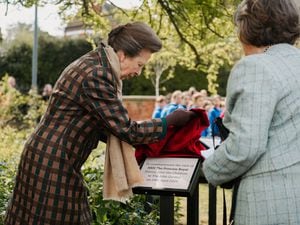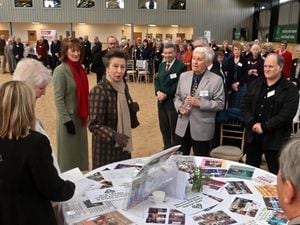Fire risk warning to Shropshire farmers over heatwave
The ongoing spell of dry and hot weather is putting farms at high risk of devastating fires, it was warned today.
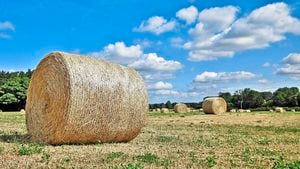
As Shropshire and Mid Wales have basked in prolonged sunshine for weeks, the heatwave has triggered numerous warnings from the agricultural industry that the tinder dry conditions can easily spark fires.
According to rural insurer NFU Mutual, the dry weather makes it more important than ever for farmers during harvest to maintain their buildings and equipment to reduce the risk of a fire breaking out. It says farmers should also have an established evacuation plan in case of fire.
NFU Mutual’s rural affairs specialist, Tim Price, said: “We are urging farmers to reduce the risk of fire by making sure that fire extinguishers on combine harvesters are serviced before harvest starts, and to make sure regular maintenance and cleaning to remove chaff is carried out.”
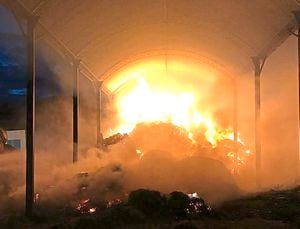
The warning comes as about 30 firefighters fought a huge barn blaze near The Wrekin on Sunday.
Shropshire Fire and Rescue Service said crews were called a farm, in Rushton, where they found bales of hay well alight.
The fire service posted spectacular images of the operation on Twitter as crews got the flames under control at the site about 8pm on Sunday.
“Safe, assertive actions by crews prevented fire spread to nearby buildings and equipment,” it said.
Crews including the light pumping unit and the water carrier based at Bridgnorth, crews from Church Stretton, Hodnet, Much Wenlock, Shrewsbury, Telford and Wellington along with operations and safety officers attended the scene.
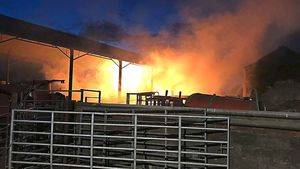
About 20 firefighters and farmers also fought a blaze involving a combiner harvester in Lodmore Lane, Burleydam, following reports of bales of a fire involving hay, straw and the vehicle on Sunday.
The NFU in Shropshire says it is working closely with the Environment Agency, public water supply companies and Defra to assess the situation for members as this spell of dry weather continues.
Spokesman Oliver Cartwright said: “Shropshire farmers are more than aware of the risk of fires and know what steps to take given the tinder box conditions. However they are pleading with people not to use portable barbecues near standing crops and to be careful when discarding cigarette ends and glass.
“They should also not release sky lanterns or let off fireworks.”
Harvesting starts two weeks early
Harvesting is already under way on fields in Shropshire and Mid Wales, around two weeks ahead of schedule
Unusually high temperatures and lack of rainfall has brought forward the familiar sight of hay bales dotting the landscape.
The heatwave has had a profound affect on farms, according to the NFU.
Its West Midlands representative Oliver Cartwright said farmers are working hard to ensure business carries on as usual despite the challenges.
“Conditions are extremely challenging and the hot weather will have a marked impact on yield and quality across all Shropshire farms,” he said.
“Winter barley was three quarters there ahead of the heatwave and it, like oil seed rape, which has large reserves, will be down this year alongside the wheat which was hit at a critical stage for grain filling.
“Cereal prices though are at current highs – although we must remember that crops are globally traded.
“Straw will also be in demand as it will be a short crop this year, however, we are hopeful we will be able to bale more than in 2017 when the weather was wet during harvest.
“We did see a wet winter and spring, which helped with water reserves briefly but there is now a strain on supplies.
“Potatoes growth has been affected, the plants don’t do well in temperatures over 25 degrees and we’ve had that every day for some time now.
“While grass growth across the West Midlands is poor and many farmers have opened their silage clamps to feed their stock, depleting reserves for later in the year although they may be able to supplement some of it.”
Mr Cartwright said farmers are professional stockmen and women and are skilled at looking after their stock in the heat.
He said: “The NFU will continue to support its members and its Fodder Bank remains open to help members find animal feed for their farms, or sell any surplus to assist others.”

